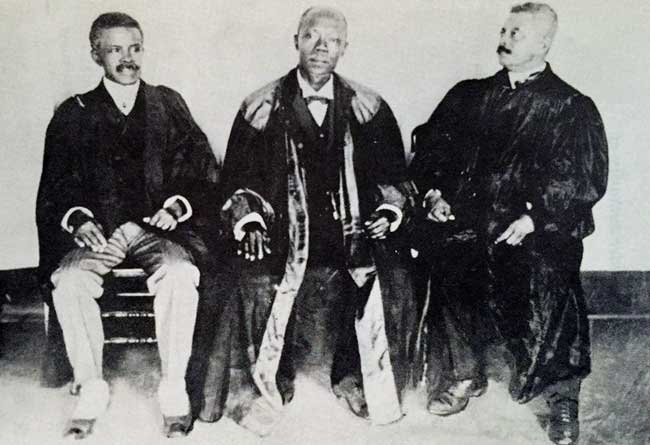Western Lawyers Go Back In Time To Repair Liberia's Broken Legal System
May 7, 2015
Former president Charles Taylor left behind a judicial system in chaos, but now volunteers for Lawyers Without Borders have painstakingly indexed precedents set by cases dating back to 1861 to help restore justice

Restoring the rule of law requires exacting sacrifices. Compiling an index of antique court reports takes years of dedication. For Liberia, however, it has been legally liberating.
Since 2009, lawyers in London and Washington have been summarising thousands of cases from the west African state dating back to 1861 to create a list of precedents for judges to consult in court.
The final reference work, coordinated by the charity Lawyers Without Borders, is about to be printed and sent out to one of the few countries that – due to power cuts – prefers its documents in hard paper copies rather than in digital form.
The manual, published in several volumes, is required to repair the civil war damage inflicted on Liberia's legal profession by the former guerrilla leader and president Charles Taylor, who is serving 50 years for war crimes in a British jail.
Taylor withheld salaries from judges and police, while judgments were said to have been sold to the highest bidder. Liberia, originally founded by freed American slaves, established a government based on the US constitution and adopted the common law judicial system in which precedents set by previous cases are legally decisive. Without a comprehensive index, past cases become inaccessible and are lost.
Assembling, cross-referencing and updating judgments may sound like a cruel and unusual punishment. Katie Williams, 30, a solicitor in London was one of more than 200 at the City law firm Linklaters who volunteered to do the pro bono work in her spare time.
"We looked at cases between 1861 and 2007," she explained. "We had thousands of digest sheets to fill in. Each was compiled and put into reference volumes.
"Many were criminal cases, though I tended to review land law hearings where there were squatter's rights issues. It was a matter of fitting it around my other work and reading them in the evenings.
"In English law you can have very lengthy judgments that run to over 100 pages; these were shorter," she added. "I must have read or reviewed digests of between 100 and 200 judgments over a five-year period. In Liberia they still prefer hard copy. There's a sense of relief that the project is drawing to an end but it's great to know they are being handed around to the judges in Liberia."
Christina Storm, founder of Lawyers Without Borders, said she realised there was no general index to Liberia's law reports. "Producing an online search tool [would not have worked]," she explained. "So we received a grant from the World Bank to create a reference digest. There were 30 volumes of law reports between 1860 and 1960.
"We discovered that just before Charles Taylor arrived and the courts stopped functioning, there was a judge who had taken a galley-proof of court decisions out of the country. We got those but then realised the judges couldn't access them.
"So we recruited lawyers at Linklaters and another firm to read and digest every case from beginning to end. It's in printed form so judges in the rural areas as well as in the capital, Monrovia, can find the cases.
"We will keep going and make it a sustainable programme. We have just issued a five-year supplement to the index. At one stage recently we were sending someone to Monrovia to pick up the only copy of judgments in existence, bring them back to Washington, copy them and then hand deliver them back to Johnnie Lewis, the chief justice. We did that for several years until they started making photocopies."
Altogether 10,000 Liberian cases have been read and summarised. Another programme Lawyers Without Borders has been developing is on human trafficking; the court records seemed to show the problem did not exist.
"But as we started reading back through the cases we realised it had been there – they just called it 'slavery'," Storm said. "Later they prosecuted the cases as kidnapping."
The old cases were beautifully written and scholarly, she added. "It was shocking what Charles Taylor did to the legal system."
One of the judgments from 1861, on a slander case, states: "The duty of the courts is to guard with an eagle's eye the consitution and the laws and only upon satisfactory proofs [is] a citizen to be held responsible for an abuse of his constitutional liberties."
Source: By Owen Bowcott - The Guardian










